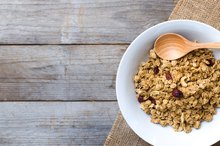Reasons Elderly People Lose Weight
You spend much of your life trying to keep your weight down, but with age, shedding pounds can be cause for concern rather than celebration. In fact, according to a report in American Family Physician, unintentional weight loss — which is defined as dropping more than 5 percent of your body weight in six to 12 months — occurs in 15 to 20 percent of older adults and is linked to an increased risk of hospitalization and death. Fortunately, most of the time, doctors can easily identify the reason the number on the scale has suddenly dipped. Read on for four factors that can lead to losing weight when you don't mean to.
Why Mood Matters
"Appetite is strongly influenced by the environment and mood," write the authors of a paper in the journal Nursing Older People. Those who experience a loss of independence, decline in health or decrease in social activities may feel depressed and have less motivation to eat. If that's the case, researchers say that making meals more social — by joining a lunch club or inviting family over — can help.
Read more: Tips on How to Gain Weight for Seniors
- "Appetite is strongly influenced by the environment and mood," write the authors of a paper in the journal Nursing Older People.
- If that's the case, researchers say that making meals more social — by joining a lunch club or inviting family over — can help.
The Role of Illnesses and Medications
400 Calorie Meal Ideas
Learn More
When chronic health conditions set in, the risk of weight loss increases. In addition to illness-related depression and lack of appetite, medications that list weight loss as a side effect play a role. Add these to any treatment — such as chemotherapy — that causes nausea or vomiting, and there will be a significant decrease in food intake. The impact can last longer than the treatment, too, as elderly people may develop food aversions based on what they were eating around the time they felt sick. Talk to your doctor if you're worried your health conditions or meds may be contributing to your weight loss.
- When chronic health conditions set in, the risk of weight loss increases.
- The impact can last longer than the treatment, too, as elderly people may develop food aversions based on what they were eating around the time they felt sick.
Physical Changes Are a Factor
During the aging process, your body loses muscle mass, which slows your metabolism and may cause you to eat less than they once did. Research also suggests that people over 80 may produce more of the hormone that signals fullness, which means you'll feel satisfied after eating the slightest bit. On top of all that, your senses of taste and smell decline with age, so you may notice that foods you love don't taste quite the same as they did before. Look to brightly colored fruits and vegetables and an array of spices (think: garlic, ginger, sage and more) to help make your food more appealing, suggests the National Institute on Aging.
Read more: Quick Nutritious Meals for Elderly
Trouble Chewing and Swallowing Are All Too Common
How Many Times Should You Chew Your Food for Weight Loss?
Learn More
Losing teeth or wearing dentures makes chewing difficult, which could limit the kinds of foods you can eat. Swallowing difficulties can occur with various conditions and treatments, such as stroke or cancer. It is not safe for a person with swallowing dysfunction to eat just any kind of food, as the food could go down the wrong way and cause choking or lung infections. Elderly people who have difficulty chewing or swallowing should take to their doctor about a special diets to minimize risk.
If you're otherwise healthy, but still have trouble swallowing, a lack of saliva could be to blame — it's estimated that a third of people over 65 fall into this camp. To help, take sips of water throughout your meal and avoid extremely dry foods.
Read more: Soft food Ideas for the Elderly
- Losing teeth or wearing dentures makes chewing difficult, which could limit the kinds of foods you can eat.
- It is not safe for a person with swallowing dysfunction to eat just any kind of food, as the food could go down the wrong way and cause choking or lung infections.
Related Articles
References
Writer Bio
Andrea Abbe is a registered dietitian and licensed dietitian/nutritionist. She has served as a nutrition education coordinator in a public health program, a nutrition instructor and counselor for a corporate wellness program and a clinical dietitian for an academic medical center. Abbe holds a Bachelor of Science in dietetics.









